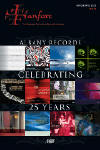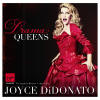Texte paru dans: / Appeared in:

Fanfare Magazine: 36:4 (03-04/2013)
Pour
s'abonner / Subscription information
Les abonnés à Fanfare Magazine ont accès aux archives du
magazine sur internet.
Subscribers to Fanfare Magazine have access to the archives of the magazine
on the net.
Virgin
6026542

5099960265425 (ID260)
Consultez toutes les évaluations recensées pour ce cd
~~~~ Reach all the evaluations located for this CD
Here is another diva disc, this one performed by one of the brighter stars in the operatic firmament, Joyce DiDonato, who has achieved a well-deserved reputation for her lively and dramatic performances in a wide repertory ranging from Mozart to Massenet. Here, she is joined by musicologist Alan Curtis and the Complesso Barocco period ensemble to extend her reportorial range to include composers from as early as the middle of the 17th century, in effect establishing herself as an interpreter of virtually the entire realm of opera. Given that many singers only concentrate upon specific periods or composers, this is a tall order, but it appears from her chatty preface that this was a project that she was not only interested in exploring, but that she had a great deal of fun with as well. Moreover, it seems like one that can be translated to the concert stage, as indeed it has in Europe and North America, according to what I can find on the Internet.
It is difficult to imagine DiDonato as a “drama queen,” a term that tends to be more than a little pejorative. Indeed, the arias chosen reflect more dramatic moments endemic to the type of works represented than they do true powerful and emotional outbursts. That is to say, the stylistic conventions of both text and music of this period outweigh any raw feelings, so a furore aria, for example, is just that; an expression of rage and fury as an excuse for some serious ornamentation and virtuosity rather than some sort of display of true anger. That does, however, not prohibit her from eliciting considerable drama from each aria, mostly through interpretive nuances. For instance, the excerpt from George Fredrick Handel’s Alcina (“Ma quando tornerai”) has the sorceress Alcina expressing her cruelty with powerful leaping roulades that wander all over her range, interrupted by a slow and deliberate “pity” second section that is taken at a reflective pace. Of course, she ornaments the ritornello with considerable alacrity. Her Galisuinde from Reinhard Keiser’s Fredegunda is appropriately lugubrious and plaintive, with some nice lyrical, almost straight tone, lines. Her Cleopatra in Johann Adolf Hasse’s Antonio e Cleopatra is breathless and fast-paced, complementing the often gnarly harmony of his string accompaniments. Her high notes add tremendous punch to the vocal line, emphasizing the drama. She throttles back considerably for the aria from Pietro Marc’Antonio Cesti’s Orontea (“Intorno al’idol mio”), giving a more even and respectful rendition. Here the ornamentation appropriate for the period seems to be on the slight side, but there is every emotion present in her wistful version. She ends the disc with a full-voiced version of Haydn’s Armida, where the “hate, rage, and vexation” are proclaimed with all the verve of a Rossinian bel canto heroine. It may be a bit too powerful for the accompaniment, often overpowering the colorful orchestration that Haydn provides.
Alan Curtis sets good tempos, and his ensemble performs with skill and accuracy, though at times I would have liked them to be a bit more assertive, such as in the Haydn. But on the other hand, the susurrating bassoons in the aria from Keiser’s Octavia are smooth and delightfully liquid. As one might imagine, in a disc such as this, the focus is entirely upon the soloist and her interpretations. She seems to find this a sort of therapy, or at least that is what is implied in DiDonato’s brief note following the excellent essay by Simon Heighes. That is as may be, but the reality is that she has chosen a repertory that begs for revival as a whole, “crazy plots and extreme circumstances” aside. Indeed, few of the arias can be found in situ in the discography. To be sure, there are several recordings of Alcina, of which the Erato version with William Christie and Renée Fleming is quite fine. Haydn’s Armida has also had several renditions, including Nikolaus Harnoncourt’s 2000 complete rendition with Cecilia Bartoli on Teldec. And of course one also finds Alessandro, Orontea, L’incoronazione di Poppea, and the Handel and Hasse Cleopatra operas in the current discography. There is even a Fredegunda from 2009 on Naxos, but most Giacomelli is found in excerpt format. As for the Orlandini Berenice, the Keiser Octavia, the Giacomelli Merope, and the Porta Ifigenia in Aulide, this is about it. So, in the end, it is clear that Joyce DiDonato has once again given a sterling performance that demonstrates both her versatility and interpretive skills, setting a powerful example for future mezzos in the early repertory. You can’t go wrong in obtaining this disc, whether you are interested in opera, vocal performance, or the Baroque period. There is, however, the desire that is stimulated from it for a broader contextual exploration of the entire operas, with those which have yet to receive their modern premieres at the top of the list, if the rest of the music is anything like what is on this disc. Hopefully, Joyce DiDonato is listening.
Cliquez l'un ou l'autre
bouton pour découvrir bien d'autres critiques de CD
Click either button for many other reviews


